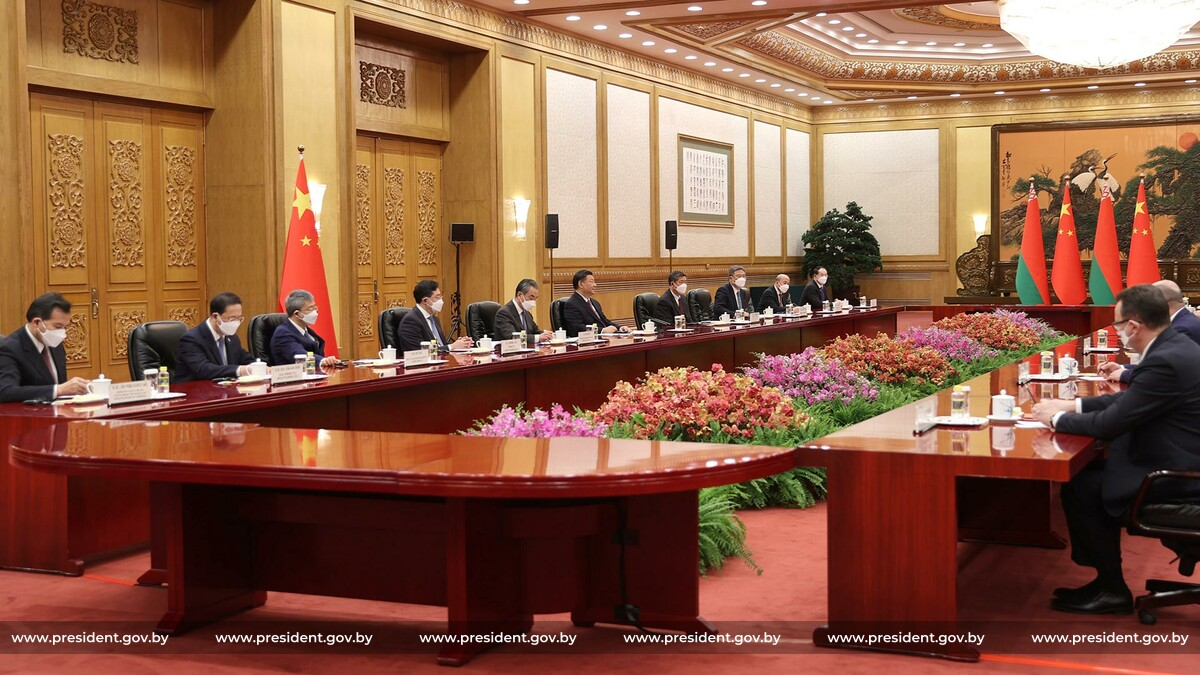Multi-vector Diplomacy: The Chinese Alternative and Access to the Sea
 The situation has not changed
The situation has not changed

The Belarusian regime is restarting the geopolitical swing machine, with China assuming the role previously assigned to Western countries. Minsk has negotiated a delay in repayment of a Russian loan for the construction of nuclear power plants and seeks to establish itself in Russian ports as the owner of terminals.
Following the widely publicised leak of the Kremlin strategy for absorbing Belarus by 2023, the Finnish Minister of Foreign Affairs, Pekka Haavisto, recounted a conversation with ex-Minister of Foreign Affairs Vladimir Makei shortly before his death and after Russia announced the annexation of four Ukrainian provinces on September 30th. According to Haavisto, Makei “was very worried about whether Belarus would be the fifth [annexed territory].”
Meanwhile, Kremlin press attaché, Dmitry Peskov, reassured the public that relations between the two countries are not an attempt to recreate the Soviet Union, characterising the Union State of Belarus and Russia as “the most advanced and rapid integration in the space of the former USSR.” He neither acknowledged nor denied the existence of a plan to absorb Belarus into the Russian Federation by 2030.
On March 2nd, Lukashenka paid a three-day visit to China, described by observers as the Belarusian ruler’s most significant foreign policy achievement over the past two and a half years. He returned with a package of Russian-Chinese memorandums and agreements with a total (official) economic value of USD 3.5 billion. Some of these agreements may theoretically contribute to the circumvention of sanctions against Belarus and the Russian Federation. Lukashenka also spoke in favour of the Chinese “peace plan” for Ukraine.
Some experts believe that the political significance of the visit outweighs the economic. The Chinese connection is important in reducing the critical political rather than economic dependence of Belarus on Russia, as is evident from trade statistics of USD 50 billion (Russia) vs USD 5.9 billion (China).
In Minsk, as in Moscow, partnership with China is characterised as “strategic”. Russian geopolitical idealogues see China as a structural component of a new anti-Western axis. However, these “strategies” lack cultural and economic support. Chinese trade with the United States and the EU reached USD 1.6 trillion, eight times more than with the “union state” (USD185 billion + 6 billion). Considering other unfriendly (to Minsk and Moscow) states, such as the countries of the British Commonwealth, Singapore, Taiwan, etc., this gap is much more significant. China conducts three times more trade with Japan and South Korea than Russia and Belarus.
Even without taking into account significant cultural differences, these metrics indicate it is premature to build an axis strategy and will remain so for the foreseeable future unless the Chinese Communists, led by Xi Jinping, begin to make risky bets.
Despite Minsk’s attempts to build a new version of the geopolitical seesaw with China, no practical alternatives to Russia and related post-Soviet structures (the Union State, the EAEU and the CSTO) are evident. Minsk has nothing to offer Beijing except for debts to Russia and Western sanctions.
Belarus has negotiated another loan repayment postponement regarding Russian financing for constructing nuclear power plants. The amended intergovernmental agreement of November 25th, 2011, specified repayments commencing on April 1st. The revised agreement stipulates that repayments will begin six months after the commissioning of the Belarusian nuclear plant and no later than April 1, 2024.
Minsk released updated plans for the development of Russian ports. According to the Minister of Transport and Communications, Aliaksei Auramenka, Belarus intends to purchase the Bronka complex in the “Big Port” of St. Petersburg in 2023 and build its own terminal (or even a port) in the Murmansk region. Where and how the regime intends to secure funding for these projects was not discussed. Due to western sanctions, Minsk has recognised Russian ports as an export priority.
Subscribe to our newsletter




Situation in Belarus
Constitutional referendum: main consequences


 Video
Video
How to count the political prisoners: are the new criteria needed?


 Video
Video
Paternalism In Decline, Belarusian Euroscepticism, And The Influence Of Russia


 Video
Video












